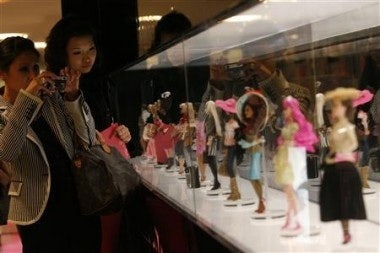Men Spending Lavishly On Watches, Jewelry, Gifts; Women Projected To Be "The Future" Of Luxury Consumption#

In the new book "Luxury China: Market Opportunities and Potential" (Jing Daily review), Chevalier and Lu note that the Chinese luxury business is still very much dominated by middle-aged men, most of whom splash out on high-priced luxury goods with the intention of giving them as gifts. However, as the authors point out, over time we can expect to see a gradual shift in power from male to female consumers:
[T]imes are changing in China and with them the purchasing patterns of Chinese consumers. As Emmanuel Prat, president of LVMH Japan, observed in 2006: "men have been the traditional buyers and in 2001, three out of four consumers were men. Now as more women are becoming economically independent, they account for a larger share of the luxury market and there is a big potential." However, while the balance is undoubtedly shifting, men are likely to continue to exercise the dominant influence in this sphere for some time to come. The reason for this is twofold: men manage the household budget; and it is estimated that half of luxury spending in China takes the form of "business gifts" -- for employees on a special occasion or for outstanding performance; for customers or for business associates.
...
Obviously, women -- particularly younger women -- will one day become the major clients of luxury goods in China...Though the movement towards younger and more feminine customers is undoubtedly under way, it remains to be seen how long this process will take to complete.
This week, a report issued by HSBC confirms many of the observations in Lu and Chevalier's book. For example, while middle-aged men remain the key luxury consumers, making most of their purchases with the intent to give them as gifts (though the HSBC report seems to hint that more of these gifts are starting to go to wives, mistresses or "second wives," despite the fact that most still go to business associates), and these men will retain their dominance in the near future, in the Chinese luxury industry, "the future is female."
British-made Vertu phones have become the badge of the seriously well-off in the city of Guangzhou, where import duty can push their prices above £70,000. The southern metropolis is also home to a Louis Vuitton shop that has a waiting list of VIPs eager to pay more than £100,000 for a Birkin handbag — twice the price on eBay.
A newspaper in the city, the Yangcheng Evening News, records that a Piaget watch exhibition sold out of timepieces costing about £80,000 and also sold one special model for more than £900,000.
A spokesman for the Swiss watchmaker was quoted as saying its sales in China have quadrupled in the past four years.
And the hottest cultural show in Beijing last season was Cartier’s stunning display of 350 precious objects titled “King of Jewellers, Jeweller to Kings” — held in the Forbidden City, no less.
Nothing is forbidden when it comes to a tiny minority of super-rich Chinese people flaunting their wealth.
...
Yves Carcelle, its chairman and chief executive, once said that in theory Louis Vuitton could open a shop in any city with more than 1m inhabitants. In China, there are 46 cities with more than 2m people but only 25 cities with Louis Vuitton branches.
That kind of growth potential led HSBC to identify China above India and other emerging markets as the richest potential seam of big spenders in the next few years.
Apart from the handful of politically connected tycoons whose propensity to spend has emptied the showrooms of Rolls-Royces, there are an estimated 825,000 people in China worth more than £1m.
...
“The future is female,” the report claims, predicting the brands they favour are likely to increase their market share as the overall pie grows larger. The rapid recruitment into office life for millions of staff hired since China joined the WTO has increased women’s financial independence.
The findings of the HSBC report fit well with what many observers on the ground in China have seen developing over the last year, particularly in regards to the increasing buying power (and financial independence) of female luxury consumers. In a Forbes article last summer, Shaun Rein said companies should be acutely aware of the female demographic when trying to sell anything -- including luxury goods -- in China. Even though men remain the dominant buyers of these products at the moment, as Rein illustrates, women are the principal buyers of some brands (like Louis Vuitton). From the article:
Women now contribute about half of household income, up from 20% in the 1950s. Their educational opportunities have greatly grown, and they've entered the white-collar workforce. At my own strategy consulting firm, women outnumber men three to one. They now spend as much as men on luxury consumption, accounting for 50% of luxury purchases from companies like Louis Vuitton and Gucci.